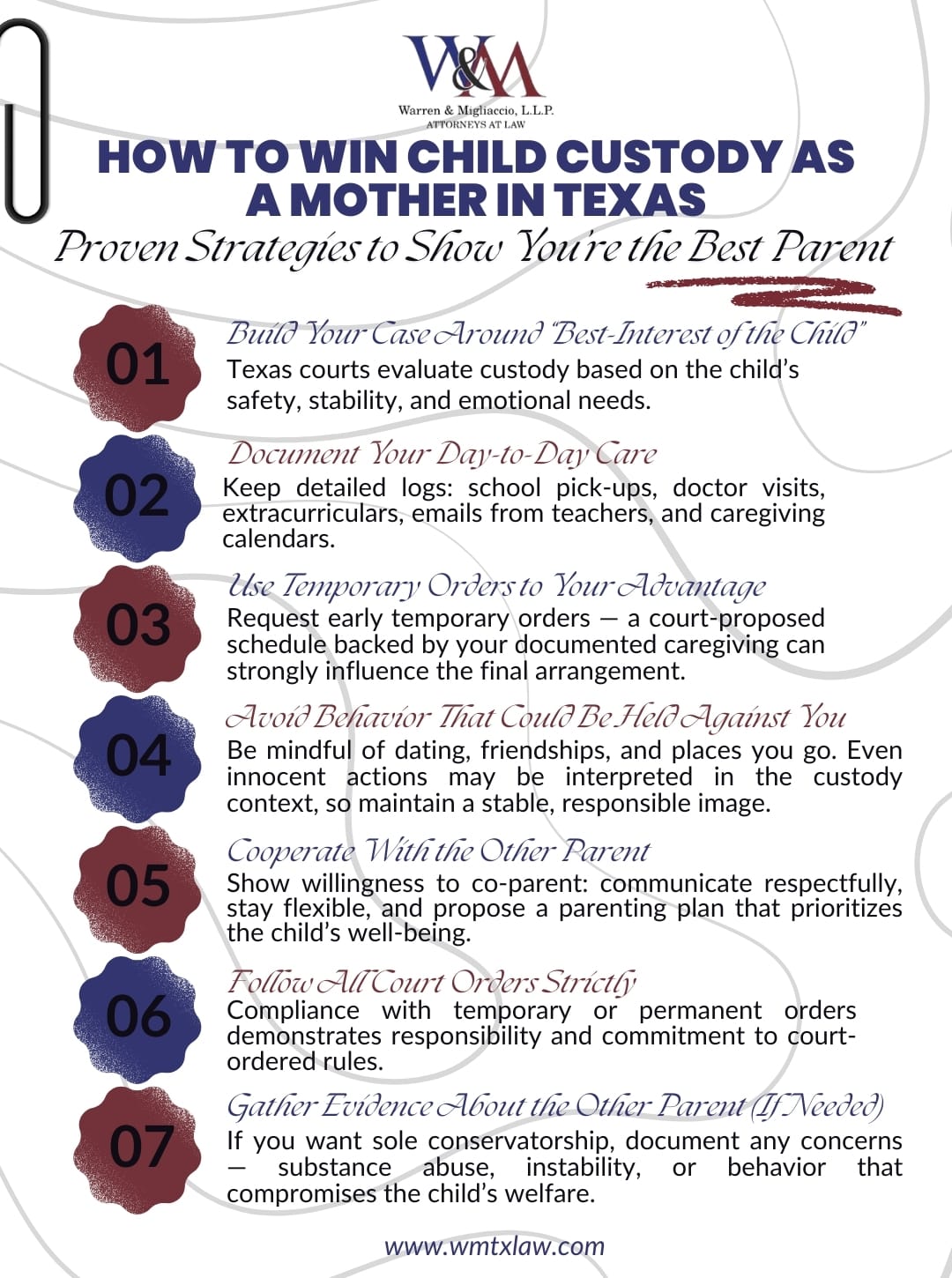In Texas, mothers improve their odds of securing primary conservatorship by showing the child’s best interest: steady daily care, a safe home, predictable routines, and respectful co-parenting. Early temporary orders—and consistent follow-through—carry weight and often shape the final arrangement.
Your definition of “winning” child custody depends on your goals. Perhaps your main goal is having your child live with you over the other parent. On the other hand, you may wish to prevent your child’s other parent from getting custody or visitation rights. Below, our Texas child custody lawyers discuss the basic principles of child custody and offer tips about how to win custody of a child for mothers in Texas.
Quick Answer: How can a mother win child custody in Texas?
Texas applies the best-interest standard: maintain safe, stable parenting, follow all orders, and present clear evidence—temporary orders and deadlines can quickly shape your case. Tex. Fam. Code § 153.002.
- Document caregiving proof
- Follow all court orders
- Propose a stable parenting plan
Understanding Child Custody Basics in Texas
Texas law makes the child’s best interest the primary consideration in conservatorship and possession decisions. Texas Family Code § 153.002. This means that the courts do not prefer or automatically choose mothers over fathers for custody.
Texas prohibits discrimination based on sex or marital status when considering conservatorship. Tex. Fam. Code § 153.003. Every child custody matter comes down to what is in the best interest of the child.
Texas law generally favors joint custody or joint managing conservatorship. There is a rebuttable presumption that appointing the parents as joint managing conservators is in the child’s best interest. Tex. Fam. Code § 153.131; see also § 153.134
Under a joint conservatorship order, both parents share parental rights and duties regarding the child. However, equal time is not required under joint managing conservatorship. Tex. Fam. Code § 153.135. The belief is that, in most cases, it is in the child’s best interests to maintain healthy relationships with both parents.
However, that does not mean the family court never grants sole custody, or sole managing conservatorship. The court may grant sole custody if it considers a parent unfit due to factors like domestic violence or addiction. Evidence of family violence, sexual abuse, or serious endangerment can bar joint conservatorship and support sole managing conservatorship. Tex. Fam. Code § 153.004; § 153.131.
Keypoints
- Texas custody turns on the child’s best interest.
- Temporary orders often shape final outcomes.
- Proof of daily caregiving strengthens your case.
- Follow all court orders and timelines.
- Propose a practical, child-focused schedule.
How to Win a Texas Child Custody Case in Texas
Ultimately, the best approach to a child custody case is knowing your goals and pursuing them with the child’s best interests at heart. By keeping your child’s best interests at the forefront of the case, you will avoid being motivated by anger or revenge. Additionally, the following tips can help you strengthen your child custody case:
1. Be Involved in Your Child’s Life

Two of the most effective ways to demonstrate your commitment as a parent are by maintaining your parental duties and consistently being involved in your child’s life and activities. In many cases, the parent most involved in their child’s life has an advantage during child custody matters.
In addition to maintaining a safe home environment and proactively addressing your child’s needs, your involvement shows your investment and desire to be present in every aspect of your child’s life. For example, you should continue to be involved in areas of your child’s life such as their:
- Education, such as school functions and parent-teacher conferences
- Extracurricular activities
- Medical appointments
Additionally, you should continue spending quality time with your child. Even simple activities like discussing their day or reading with them can strengthen the child’s relationship with you. It can instill a sense of stability and emotional support in your child’s life. Texas courts look at “best-interest” factors—such as safety, stability, and caregiving—recognized in Holley v. Adams, 544 S.W.2d 367, 371–72 (Tex. 1976).
Case Study: Winning Temporary Orders by Proving Daily Care
Maria came to us exhausted and anxious. Pickups were chaotic, the school was calling about tardies, and she worried she might lose her custody battle. We listened and narrowed the goal: show the judge who actually handled the day-to-day care.
We gathered simple, real-world proof—school attendance and teacher emails, the pediatric portal, activity calendars, and a short caregiving log. And we organized it by week and tied it to best-interest basics: safety, stability, and routines. At the temporary-orders hearing, we led with that evidence and offered a practical schedule that protected school nights and regular medical care.
The judge granted Maria primary time during school weeks, set clear exchange rules, and required respectful, written co-parent communication.
Takeaway: If you’re the steady parent, document it. Clean, organized proof—paired with a realistic parenting plan—can win temporary orders that often shape the final custody arrangement.
2. Avoid Anything that Could Be Used Against You

In a child custody battle, the goal is to present yourself as a stable, responsible, and caring mother. Part of this process is that you should exercise caution in both personal behaviors and the environments to which you expose your child. Unfortunately, even seemingly innocent actions can be twisted and used against you to hurt your case.
For example, examples of areas of your life that may be scrutinized during child custody proceedings include, but are not limited to:
- Dating and new relationships. Introducing a new partner to your child prematurely or dating someone with a questionable background can hurt your case. Consider how the relationship might be viewed in the context of your child’s best interests. If you choose to date, ensure the environment around your child remains stable and consistent.
- Friends and associations. You may be judged by your associations with others and who you bring your child around. Spending time with friends or family members with criminal backgrounds or who engage in risky behaviors could hurt your case even if you are not involved.
- Places you visit. Frequenting venues like bars or other adult entertainment spots, going to parties, or consistently spending late nights out could hurt your case. Where you visit may be used as an indicator of your lifestyle choices.
In addition, anything you say to or about the other parent can be used against you to hurt your case. You want to avoid texts, emails, or other forms of communication where you might be construed as threatening, confrontational, or derogatory toward the other parent. It is essential to maintain civility, even when tensions are high.
You should also avoid bad-mouthing the other parent in front of your child, in public, or online. The court may view this behavior as trying to alienate your child from their other parent, hurting your case.
Related Guides:
3. Cooperate With Your Child’s Other Parent

Texas courts favor parents who can cooperate with each other for the child’s best interest. Showing you can communicate respectfully, compromise, and make important decisions with the other parent can be a significant advantage.
We understand that custody matters can be stressful, demanding, and emotionally charged. However, a demonstrated willingness to cooperate can show that you put your child’s best interests first.
For example, cooperation may mean showing flexibility in visitation schedules when needed. It may include maintaining open lines of communication about your child. It may also include making decisions about your child’s well being, including their education, health and emotional needs.
Related Guides:
- What Should You Not Do During a Custody Battle in Texas?
- Withholding a Child from Another Parent Without Court Order in Texas
4. Follow Court Orders
Courts may issue temporary orders for a child’s safety and welfare while a case is pending. Tex. Fam. Code § 105.001. If the court issued any orders about conservatorship or care, it is imperative to follow them. Following court orders shows your commitment to your child’s best interests.
It is important to remember that the court bases every custody decision, including physical custody, on what they determine to be the child’s best interests. The court may interpret failure to follow court orders as a lack of responsibility and an unwillingness to prioritize your child’s welfare.
Related Guide: Custodial Parent Not Following Court Order in Texas: Your Legal Options
5. Gather Information About the Other Parent

Depending on your child custody goals, you need information and evidence about the other parent that supports and strengthens your case. For example, if you want sole conservatorship, you must prove why the other parent should not get custody rights. Relevant information about your child’s other parent may include, but is not limited to:
- History of substance abuse or addiction
- Past or current domestic violence or child abuse
- Past mental health issues or untreated issues
- Criminal history
- Risky behaviors, such as gambling
If this behavior does not apply, other relevant information may include:
- Child neglect or past parenting issues. Document instances where the other parent neglected their parenting responsibilities. Examples may consist of forgetting to pick up your child from school, not attending important events, or failing to provide basic care.
- Unreliability. Keep a log of missed visitations or any inconsistencies in the other parent’s schedule that could disrupt your child’s routine.
- Other relevant behavior. Document issues like frequent job changes, housing instability, or association with individuals who might pose a risk to the child.
For another perspective on helpful tips, please click here.
Reach out to our experienced family law attorney at (888) 584-9614 today to learn about the complete legal process in detail!

Frequently Asked Questions
FAQs About Best Interest & Primary Custody
What factors do Texas judges look at to decide which parent gets primary custody?
Texas courts decide conservatorship by the best-interest standard, often guided by Holley factors. Judges weigh the child’s needs and risks, each parent’s caregiving history, home stability, plans for the child, and—when appropriate—the child’s preference. Keep your proof tied to the child’s outcomes.
How can a mother show she’s the “primary caregiver” in a Texas custody case?
Document daily care and consistency with third-party proof showing you manage school, health care, activities, and routines.
School attendance and communications
Medical/therapy records and portals
Activity calendars, pickups, and caregiving logs
When will a Texas court award sole managing conservatorship to a mother?
Courts consider sole managing conservatorship when joint decision-making isn’t safe or workable, such as family violence, abuse, serious substance abuse, or profound instability. The decision still turns on the child’s best interest and admissible evidence.
FAQs About Conduct, Schedules & Relocation
What hurts a mother’s chances of winning custody in Texas?
Conduct that undercuts best interest—alienation, unsafe associates/places, repeated instability, violating orders, or poor school attendance—can harm your case. Keep communications civil, child-focused, and follow all court directives.
What is the Standard Possession Order (SPO) in Texas, and how does it affect mothers?
The SPO is the default parenting-time schedule. Courts can customize it for distance, age, and best interest. If you seek primary conservatorship, explain why a specific schedule supports stability, schooling, and frequent, quality time with both parents where safe.
Can a mother move with the child if there’s a Texas custody order?
Many orders include a geographic restriction. Relocation typically requires agreement or court approval. Judges weigh stability, schooling, family ties, and the other parent’s access before modifying orders; propose a realistic plan that protects the child’s time with both parents.
FAQs About Temporary Orders, Evidence & Myths
How do temporary orders work in a Texas custody case?
Temporary orders set short-term custody, possession, and support while the case proceeds. They shape the status quo, so present clean evidence early: caregiving history, safety concerns, school stability, and a practical parenting plan the court can adopt.
What evidence helps a mother prove “best interest” in Texas?
Use child-focused proof tied to stability and outcomes.
Attendance/grades and teacher notes
Health/therapy compliance and follow-through
Safe housing, steady employment, and cooperative co-parenting
Do Texas courts favor mothers?
No. Texas does not presume mothers get custody. Courts usually order joint managing conservatorship unless safety or feasibility says otherwise. Real-world parenting evidence—not gender—drives best-interest decisions.
FAQs About Safety, Rights & Modifications
How do supervised visitation and safety concerns work in Texas?
If safety is a concern, the court may order supervised visitation or protective conditions. Provide specific, admissible evidence (police/CPS records, medical notes, messages). The goal is child safety while preserving parent-child relationships when appropriate.
What are a mother’s rights if she isn’t married to the father (SAPCR)?
Unmarried parents establish orders through a SAPCR. If paternity is acknowledged or adjudicated, the court can set conservatorship, possession, and support. Mothers should prepare best-interest evidence just as in divorce cases.
How can a mother modify a Texas custody order?
File a custody modification showing a material and substantial change (e.g., relocation, schedule breakdown, safety issues) and that the change serves the child’s best interest. Keep logs, attendance records, and communications to support the change.
FAQs About Child Preference, CPS & Enforcement
How does the child’s preference affect custody in Texas?
A judge may consider a child’s wishes, typically by interview in chambers, factoring age and maturity. Preference is one factor, not decisive; it’s weighed with best-interest evidence like stability, safety, and parental involvement.
How do CPS investigations affect custody outcomes?
CPS records, safety plans, and findings can influence best-interest analysis. Cooperate fully, follow recommendations, and present remediation steps. Courts focus on current safety and stability, not just past allegations.
What happens if the other parent violates a Texas custody order?
You can seek enforcement for missed exchanges, withheld possession, or other violations. Keep detailed logs and supporting evidence; courts can order make-up time, fines, and other remedies aligned with the child’s best interest.
Schedule a Consultation With Our Texas Child Custody Attorneys
We hope our tips above about how to win child custody for mothers in Dallas, Texas have been helpful to you. We know these matters can be challenging, frustrating, and stressful. However, you do not have to face this difficult time alone. Our Texas family law and child custody lawyers help mothers like you navigate the process and get the best possible results for their cases.
At Warren & Migliaccio, your child’s best interests and your wishes are at the heart of every child custody case we handle. We encourage you to reach out to us today to avail the best legal representation. Discuss your unique situation and learn how we can help you with your case. Contact our law firm online or call us at (888) 584-9614 and we will contact you to schedule a consultation soon. You can also visit our law office during business hours to get the best legal advice from Texas best family lawyers.

